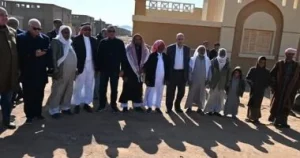Major General Dr. Khaled Mubarak, Governor of South Sinai, inspected Al-Naqab Village in Taba City. During the visit, he reviewed the progress of a project to construct 60 Bedouin homes over an area of 54,000 square meters. This initiative aligns with efforts to improve living standards in Bedouin areas and implement sustainable development plans as part of Egypt’s 2030 Vision.
The governor emphasized that the project reflects the state’s commitment to developing Bedouin areas and ensuring a dignified life for the residents. The project aims to enhance the living conditions of the village’s inhabitants by building well-equipped homes, each covering 180 square meters. These homes will feature three bedrooms, a reception area, a kitchen, a bathroom, and front and back courtyards, providing a comfortable living environment tailored to the needs of Bedouin families.

Table of Contents
ToggleEngaging with Local Residents
During the visit, Dr. Khaled Mubarak listened to the residents’ suggestions and opinions, affirming the governorate’s dedication to addressing their needs and providing all necessary support. He also announced temporary measures to increase the water supply to the village until a permanent well is dug to ensure freshwater availability for the area’s residents.
Enhancing Healthcare Services
To improve healthcare services, the governor instructed the Directorate of Health to prepare a detailed report outlining the needs of the village’s health unit. This step aims to ensure its operation and deliver essential healthcare services to the community. The governor stressed the importance of synchronizing housing projects with the provision of critical services to guarantee an improved quality of life in the region.
A Comprehensive Vision for Development
Governor Khaled Mubarak highlighted that the Bedouin housing project is part of a broader vision to develop remote and Bedouin areas across South Sinai. He reiterated that the governorate is working on implementing development plans aligned with the needs of residents, contributing to sustainable development throughout the region.




